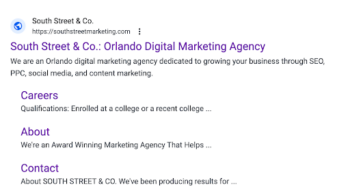TABLE OF CONTENTS
- 1 What is Local SEO?
- 2 Set up Your Google Business Profile
- 3 Optimize Your Website for Local SEO
- 4 How to Maintain Consistent Citations Across Various Platforms
- 5 How to Get Listed in Local Business Directories
- 6 How to Get Listed in Legal Directories
- 7 Get More Reviews
- 8 Monitor and Adjust Your Local SEO Strategy
- 9 Make Your Website Your Law Firm’s Greatest Lead Generator
As an attorney, you need your website to be a useful tool to your law firm. We’re here to help you maximize your investment and turn your website into a lead driver.
A recent survey from the American Bar Association found that almost 90% of all law firms have websites. However, in the digital age, your website is only a useful tool if you know how to turn it into one. This is where we look to SEO, or Search Engine Optimization. Our Orlando local SEO agency optimizes your website to increase traffic, visibility, and brand awareness. With the right local SEO strategy, your website’s visibility and lead generation potential grow exponentially.
Today, we will get even more specific and discuss how you can use local SEO to enhance your law firm’s website. Local SEO is a crucial strategy for law firms looking to attract clients from their specific geographic area. By optimizing your website for local search, you can ensure that your firm appears in search results when potential clients are looking for legal services in your area.
In this blog, we’ll explore the key elements of local SEO for law firms, including a downloadable checklist to help you implement these strategies effectively. Whether you’re just starting with local SEO or looking to refine your existing efforts, this guide will provide actionable insights to boost your online presence and attract more local clients.
What is Local SEO?
Local SEO takes standard SEO a step further by optimizing your website specifically for local traffic. If you’re a smaller law firm primarily targeting one service area, this is the SEO strategy you want to focus on.
Local SEO ensures that your website appears prominently when someone in your area searches for services like ‘family law attorney near me’ or ‘tax attorney near me.’
The importance of local SEO cannot be overstated. When potential clients search for legal services in their vicinity, they are often ready to take action.
Ensuring that your law firm appears in these local searches can significantly increase your chances of attracting new clients. Local SEO involves various techniques designed to improve your visibility in local search results, from optimizing your Google My Business profile to ensuring your website includes local keywords and content.
By focusing on local SEO, you can effectively compete with other local law firms, attract more local clients, and grow your practice. In the sections that follow, we will delve into specific strategies and best practices for implementing local SEO, ensuring your law firm stands out in local search results.
Set up Your Google Business Profile
Google Business Profile is a powerful (and free) tool crucial for businesses’ local SEO, online visibility, and appearance on Google Maps. A well-optimized Google Business Profile listing can significantly increase your customer base by allowing your business to appear in Google Maps and Google search results. The best part about Google Business Profile is that any business owner can utilize this effective resource.
- Sign in to your Google Account – Go to the Google Business Profile page and sign in with your Google Account. If you don’t have one, you will need to create one. Don’t worry, it’s also free.
- Begin adding your business – Click the “Manage Now” button to begin the setup process. Then, start by entering your business name. (If your company name doesn’t appear in the suggestions, then choose “Add your business to Google.”
- Enter your business information – Select the category that best describes your business, add your business address, specify your service area, and add your contact information. Note that the business address you enter will be the address that shows on your Google Maps listing.
- Verify your business – Google will usually request a video recording that shows your location, equipment, and proof of management. Sometimes, you may be able to verify your address via phone or email.
Optimize Your Website for Local SEO
Optimizing your website for local SEO is essential for ensuring that potential clients in your area can easily find your law firm. This involves several key elements of on-page SEO tailored to improve your local search rankings. You can download our checklist to make sure you haven’t missed any important components.
Here’s how to get started:
Use Title Tags and Meta Descriptions with Local Keywords
Title tags and meta descriptions are crucial for both search engines and users. Include local keywords in these elements to signal to search engines the specific area your law firm serves. For example, instead of a generic title like “Family Law Attorney,” use “Family Law Attorney in Orlando.”
Take a look at our home page’s title tag and meta description. The title tag is “South Street & Co.: Orlando Digital Marketing Agency.’ This is how our website appears on Google, and it not only tells the searcher what we do, it also tells them where we conduct business.
Create Localized Content
Content is king, and localized content is even more powerful. Develop blog posts, service pages, and other content that addresses the needs and interests of your local audience. This can include discussing local laws, community events, and specific cases relevant to your practice area and location.
Add Schema Markup for Local Businesses
Schema markup is a type of structured data that helps search engines understand the content of your website. By adding local business schema markup to your website, you can provide search engines with detailed information about your firm, including your address, phone number, business hours, and more. This can enhance your visibility in local search results and improve your chances of appearing in rich snippets. Many plugins, like Yoast, offer easy ways to add schema markup to your website.
Check for Mobile Optimization
57% of local searches are conducted on mobile devices. Ensure your website is mobile-friendly by using a responsive design, optimizing loading times, and making it easy for users to navigate and contact your firm from their mobile devices.
Create Localized Landing Pages
Create separate landing pages for each city or region if your firm serves multiple locations. These pages should be optimized with local keywords and provide relevant information about your services in that specific location. This can help you rank better for local searches in each area you serve. If you have several key services you want to rank for, it can be helpful to create local service pages for each location and individual service.
Build Local Citations
Local citations are mentions of your law firm’s name, address, and phone number (NAP) on various online platforms. These citations play a crucial role in local SEO by helping search engines verify your business’s existence, legitimacy, and location.
The more consistent and accurate your citations are across the web, the more likely search engines will trust your business and rank it higher in local search results. Citations can come from a variety of sources, including local business directories, legal directories, and industry-specific websites.
How to Maintain Consistent Citations Across Various Platforms
Audit Your Current Citations: Start by auditing your existing citations to identify any inconsistencies. Use tools like Moz Local or Semrush Local to find where your business is listed and check for accuracy.
Standardize Your NAP Information: Decide on a standard format for your NAP information and use it consistently across all listings. For example, if your address is listed as “123 Main St., Suite 200” on your website, make sure it appears exactly the same on every other platform.
Claim and Update Listings: Claim your business listings on major platforms like Google Business Profile, Yelp, and Bing Places. Update your NAP information to match your standardized format.
Monitor Citations: Regularly monitor your citations to ensure they remain accurate and up-to-date. This includes updating your listings if you move to a new location or change your phone number.
How to Get Listed in Local Business Directories
Local business directories are online platforms where businesses can create profiles and provide information about their services. Examples include Yelp, Yellow Pages, and local Chamber of Commerce websites. These directories are often used by consumers to find local businesses, making them valuable for local SEO.
- Create Profiles: Ensure your law firm is listed on major local business directories.
- Provide Detailed Information: Include comprehensive information about your services, business hours, and contact details.
- Encourage Reviews: Encourage satisfied clients to leave positive reviews on these directories if applicable – some directories don’t offer this feature.
How to Get Listed in Legal Directories
Legal directories are specialized platforms where law firms and attorneys can list their services and information. Examples include Avvo, FindLaw, and Justia. These directories are highly relevant to your industry and can drive targeted traffic to your website.
- Complete Your Profile: Fill out your profiles on legal directories with detailed information about your practice areas, experience, and credentials.
- Highlight Client Reviews: Showcase client testimonials and case results to build trust and attract potential clients if the profile supports this feature.
- Stay Active: Regularly update your profiles with new information, such as awards or publications, to keep them current and engaging.
Get More Reviews
One of the strongest forms of marketing is word-of-mouth referrals, and in the digital world, these referrals are most often seen through Google reviews. Often, the best way to get reviews from your clients is to ask them personally or use software programs that help automate the review process.
Monitor and Adjust Your Local SEO Strategy
Tools and Techniques for Tracking Local SEO Performance
Utilizing the right tools can provide valuable insights into how well your local SEO efforts are performing. Here are some essential tools and techniques:
Google Analytics: This tool helps you track various metrics such as website traffic, user behavior, and key events. You can analyze data to understand how local visitors interact with your site.
Google Search Console: This tool provides insights into how your site appears in Google search results. It helps you track search queries, impressions, clicks, and rankings for local keywords.
Local SEO Tools: Tools like Moz Local and Whitespark offer specialized features for tracking local search performance. They can help you manage citations, track local rankings, and monitor online reviews.
Rank Tracking Software: Use software like Semrush or Ahrefs to track your keyword rankings. These tools allow you to monitor your position in local search results and identify areas for improvement.
Analyze and Interpret Local SEO Data
Once you have the data, it’s important to analyze and interpret it to make informed decisions. Here’s how:
Assess Website Traffic: Look at the overall traffic to your site and identify the proportion coming from local searches. Analyze the behavior of these users to see if they are engaging with your content and taking desired actions.
Evaluate Keyword Performance: Monitor the performance of local keywords. Identify which keywords are driving the most traffic and conversions, and which ones need more optimization.
Review Citation Consistency: Regularly check your citations across various platforms. Inconsistent citations can hurt your local SEO efforts, so keeping them updated is important.
Monitor Online Reviews: Monitor the quantity and quality of online reviews. Positive reviews can boost your local rankings and attract more clients. Respond to reviews to show that you value client feedback.
Making Data-Driven Adjustments to Your Strategy
Based on your analysis, make data-driven adjustments to improve your local SEO strategy. Here are some actionable steps:
Optimize Underperforming Keywords: If certain local keywords are not performing well, consider revising your content to better target those terms. This might involve adding new pages, updating existing content, or improving on-page SEO elements.
Enhance User Experience: If your data shows that local visitors are not engaging with your site, focus on improving user experience. This could include making your site more mobile-friendly, improving page load times, and ensuring easy navigation.
Build More Citations: If you find that your citations are lacking, invest time in building more citations on reputable local business directories, legal directories, and industry-specific platforms.
Encourage More Reviews: Actively seek out client reviews to boost your online presence. Implement a system for requesting reviews from satisfied clients and make it easy for them to leave feedback.
Refine Your Content Strategy: Based on the insights from your analytics, adjust your content strategy to better meet the needs of your local audience. This might involve creating more localized content or addressing common legal issues in your area.
By continuously monitoring and adjusting your local SEO strategy, you can ensure that your law firm remains competitive in local search results. Regularly analyzing performance data and making informed adjustments will help you attract more local clients and grow your practice effectively.
Make Your Website Your Law Firm’s Greatest Lead Generator
As a local SEO agency in Orlando, we’ve worked with law firms from all over Florida. If you have questions about refining your SEO strategy or growing your business through digital marketing, we’re only a phone call away. Don’t try to DIY your SEO; trust the experts to do it right! Contact us today to book a complementary call to see how our Florida SEO company can help your firm grow your business.





